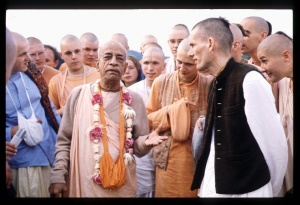CC Adi 9.4 (1975)

A.C. Bhaktivedanta Swami Prabhupada
TEXT 4
- śrī-rūpa, sanātana, bhaṭṭa raghunātha
- śrī-jīva, gopāla-bhaṭṭa, dāsa-raghunātha
SYNONYMS
śrī-rūpa—Śrīla Rūpa Gosvāmī; sanātana—Śrīla Sanātana Gosvāmī; bhaṭṭa raghunātha—Raghunātha Bhaṭṭa Gosvāmī; śrī-jīva—Śrī Jīva Gosvāmī; gopāla-bhaṭṭa—Śrī Gopāla Bhaṭṭa Gosvāmī; dāsa-raghunātha—Raghunātha dāsa Gosvāmī.
TRANSLATION
I also remember the six Gosvāmīs-Rūpa, Sanātana, Bhaṭṭa Raghunātha, Śrī Jīva, Gopāla Bhaṭṭa and Dāsa Raghunātha.
PURPORT
This is the process for writing transcendental literature. A sentimentalist who has no Vaiṣṇava qualifications cannot produce transcendental writings. There are many fools who consider kṛṣṇa-līlā to be a subject of art and write or paint pictures about the pastimes of Lord Kṛṣṇa with the gopīs, sometimes depicting them in a manner practically obscene. These fools take pleasure in material sense gratification, but one who wants to make advancement in spiritual life must scrupulously avoid their literature. Unless one is a servant of Kṛṣṇa and the Vaiṣṇavas, as Kṛṣṇadāsa Kavirāja Gosvāmī presents himself to be in offering respects to Lord Caitanya, His associates and His disciples, one should not attempt to write transcendental literature.